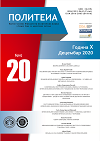Veberov doprinos analizi sadržaja
Weber’s Contribution to Content Analysis
Author(s): Željka ManićSubject(s): Social Philosophy, 19th Century Philosophy, Contemporary Philosophy, History and theory of sociology, Methodology and research technology
Published by: Fakultet političkih nauka Univerziteta u Banjoj Luci
Keywords: Weber; content analysis; The Protestant Ethic and the Spirit of Capitalism; speech at the first meeting of the German Sociological Society;
Summary/Abstract: The subject of this paper is Max Weber’s contribution to content analysis as a sociological research procedure. Content analysis gained the legitimacy of the sociological method of research in the middle of the 20th century, and Weber occupies a significant place in its history. He used the basic idea of content analysis in “The Protestant Ethic and the Spirit of Capitalism” (1904-1905). Weber drew conclusions about the institutionalised form of social communication in the past by studying its recorded content. He analysed the content of protestant catechisms to establish whether, in working with believers, pastors encouraged ethical attitudes conducive to the development of the capitalistic spirit. Later, at the first meeting of the German Sociological Society (1910), Weber proposed undertaking a comprehensive analysis of the content of the press, which did not receive the support of sociologists. His proposal represents the first methodologically designed attempt to give content analysis a place among sociological research procedures. The aim of this paper is to present Weber’s contribution to content analysis. His contribution is considered through an analysis of the application of the basic idea of this procedure in ‘The Protestant Ethics and the Spirit of Capitalism’ and through advocating its use in speech at the first meeting of the German Sociological Society.
Journal: Politeia - Naučni časopis Fakulteta političkih nauka u Banjoj Luci za društvena pitanja
- Issue Year: 10/2020
- Issue No: 20
- Page Range: 11-22
- Page Count: 12
- Language: Serbian

